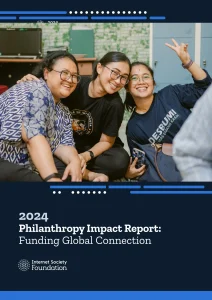Application Status
Not opening for applications in 2025
Target Audience
Research Grant Program
The Internet Society Foundation’s Research Program supports global research collaborations that advance understanding of the Internet and its value for all.
Program Objectives
- Promote novel methodologies that generate solutions to Internet-related challenges
- Identify and support a diverse and collaborative group of researchers and research institutions
- Facilitate access to intersectional research that can be applied to decision-making in government and industry
This program is intended for research that is applied and open, meaning the research seeks to answer a real-world question and should be openly published and made available to the scientific community at no cost. The Foundation supports research involving human or animal subjects when the project has been certified by a responsible body to be ethical and in compliance with local law. It is the responsibility of the Principal Investigator of the project to obtain these certifications.
Areas of Focus
Statements of interest and subsequent proposals should address topics related to one of the following thematic areas:
Greening the Internet
The Internet both affects and is affected by the environment and climate change. Having a critical awareness of this impact is key to the Internet’s resilience and ensures its sustainability for generations to come. This awareness may include an assessment of energy consumption by the Internet, or the toxins and waste generated by its use. It may consider the enabling effect the Internet has on other sectors to limit greenhouse gas emissions. It may examine the ways in which climate change and extreme weather threatens Internet infrastructure and limits connectivity. Research focusing on Greening the Internet should promote an awareness of these and other issues concerning the Internet’s environmental footprint and the sustainability measures needed for it and the planet to thrive.
The Internet Economy
New and emerging Internet-based activities have the power to disrupt our economic landscapes and lead to unpredictable economic futures. Having a firm grasp of the interactions that create the Internet Economy has the potential to reshape this uncertainty. Unpacking how the Internet transforms traditional ideas about competition, production, and consumption of goods and services could be useful in allowing for equitable and gainful participation of everyone in a rapidly digitizing global economy. Research proposals focusing on the Internet Economy should present an analysis of past or present ecosystems that yields insight into the future of the Internet and its dependent market(s).
A Trustworthy Internet
The Internet is completely trustworthy if and only if it is completely resilient, reliable, accountable, and secure in a way that consistently meets users’ expectations for information and services. The Internet is only worthy of trust when it conforms with what people expect will happen regardless of whether or not those expectations are reasonable. Further, trustworthiness is not a matter of only one layer in the network, and it is possible that some parts of the Internet are trustworthy while other parts are not. For example, while the application layer may be reliable or secure, there may be gaps in the logic or infrastructure, or there may be mistrust in the content. Research engaging the idea of A Trustworthy Internet should attempt to explain how the Internet does or does not meet user expectations and what should or shouldn’t be done about it.
Decolonizing the Internet
We acknowledge that the Internet’s development depended on industrial societies that, by their nature, used resources from lands dispossessed from Indigenous people and communities throughout the world. We acknowledge that the Internet can proliferate inequality and injustice, perhaps especially when its design is not inclusive nor its designers diverse. We acknowledge that the Internet can invalidate and make obsolete traditional forms of knowledge production and knowledge sharing and has the power to erase languages and cultures. But it also doesn’t have to. Instead the Internet can be a site of restorative, liberating, and transformational practices that bridge the past to a more just future or bring those at the margins closer to the center. Research on Decolonizing the Internet should explore these practices and other methods toward an Internet for everyone.
Eligibility
- Independent researchers should have a postgraduate research degree (PhD, Masters) and peer reviewed publications, patents, academic or independently published work in the relevant area.
- Public research institutions should be 501c3 or equivalent and should have a mission that is aligned to that of the Foundation. (Private institutions are not eligible entities to receive funding).
Additional eligibility requirements for all Foundation grants are outlined here. All applicants must ensure that they meet these basic requirements. Underrepresented groups in the research world are highly encouraged to apply.
Selection Criteria
Researchers are encouraged to submit a full application to be reviewed by the independent External Reviewers. Final submissions will be selected based on the following criteria:
- Is the research in line with one of the Foundation’s thematic areas?
- Is the research novel?
- Is the research applied and can inform decision making?
- Is the research collaborative?
- Is the research intersectional in its approach?
See more information on the independent External Reviewers.
Funding
The program provides for two levels of funding:
- Independent researchers may apply for funding up to US$200,000. Grants will be awarded directly to individuals who are identified as the principal investigator on the project and he/she will be responsible for grant management including all reporting requirements during the life of the grant.
- Organizations and institutions may apply for funding up to US$500,000. One or more awards in each of the thematic areas are anticipated subject to fiscal year funding.
You can learn more about current and past Research grants on Our Projects page.
Read the 2024 Philanthropy Impact Report
Questions
If you have questions about this program or the application process, please email [email protected].
Due to limited staff capacity, we cannot guarantee a response to questions about the application process received after the end of the working day, one day before the application window closes.


